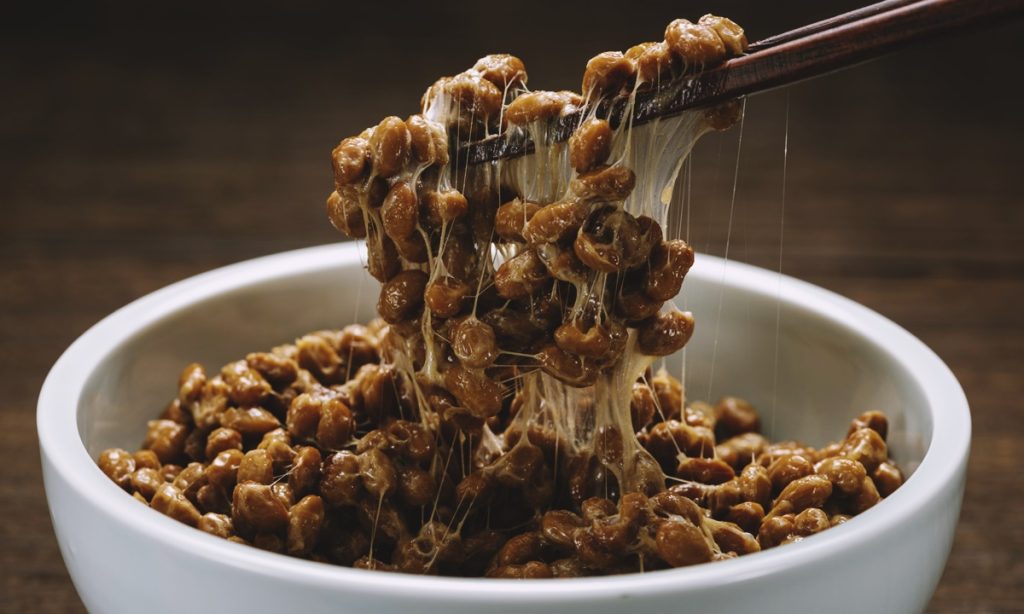Is “Natto” really good for your health? What are its benefits and side effects?
Natto may be an unfamiliar food to many in the Western world. But a study published in October 2022. In the journal Biochemistry Research International found that this traditional Japanese food has been popular in Asia for centuries. This fermented food is rich in nutrients and has only recently become popular. So let’s get to know it and see the benefits of natto .

Get to know what natto is
Natto is a traditional Japanese food made from fermented soybeans. It has a sticky texture, umami flavor, and a pungent smell. “Natto may take some getting used to for North Americans. But in Japan, it’s eaten everywhere,” says Jennifer Akimoto, a Japanese nutritionist living in Ontario.
Benefits of Natto
Given that natto is a nutrient-dense food. It’s no surprise that there are a number of health benefits associated with it. Perhaps the most impressive thing about natto is the amount of vitamin K it contains. “Natto is considered the most concentrated source of vitamin K2. Which many people may not be familiar with,” says Jon Landman, a nutritionist in Bend, Oregon. “For most people who eat a Western diet. About 75 to 90 percent of their daily vitamin K intake is in the form of vitamin K1. Which is found in abundance in green, leafy vegetables. Vitamin K2 is more easily absorbed than vitamin K1.”
Vitamin K2 is produced in very small amounts in the intestines. So most of our intake of vitamin K2 must come from our diet. It is found in some animal products, such as chicken, eggs, แทงบอล UFABET ราคาดีที่สุด ไม่มีขั้นต่ำ, and cheese, as well as fermented foods. Such as natto. Research into the benefits of vitamin K2 is ongoing, but it is believed to have protective effects against chronic diseases, such as osteoporosis and cardiovascular disease.
Although scientific research on natto is limited. As a concentrated source of vitamin K2, it is believed to have a number of health benefits, including stronger bones and improved heart health.
1. Strengthen bones
A July 2020 article in the journal Nutrients says vitamin K is important for bone health because it activates proteins that help build and maintain bone. While both vitamins K1 and K2 play a role, the Cleveland Clinic suggests that vitamin K2 may have a more protective effect.
A study published in the May 2022 issue of the journal Biomedicines found that vitamin K2 supplementation reduced the risk of bone fractures, while a systematic review and meta-analysis published in the May 2022 issue of Frontiers in Public Health suggested it may slow age-related bone mineral density loss in postmenopausal women.
It is important to note, however, that supplements may contain much higher amounts of vitamin K2 than natto, so it is unknown whether this traditional Japanese food alone would have the same effect as the doses used in these and other studies.
2. Benefits of Natto for Heart Health
Natto kinase, the active ingredient in natto, is believed to have heart health benefits. One review of research found that natto kinase helped dissolve blood clots, while other studies have found that natto kinase supplementation was associated with lower blood pressure. One study found that high vitamin K intake was linked to a reduced risk of heart disease, but more research is needed to determine the true effects.
3. Helps improve the digestive system.
As a fermented food, natto contains probiotics that help nourish the good bacteria in your gut, Sabat says. A 2022 review of research in the journal Biochemistry Research International found that natto may be helpful in balancing gut bacteria, which can help relieve gastrointestinal disorders like diarrhea and constipation.
Precautions for consuming natto
Natto is generally considered safe for most people, but some people may experience digestive issues, such as bloating and gas, Sabat says. Because natto is made from fermented soybeans, it may not be suitable for those with soy allergies, Marcus says.
Case studies, such as one in Japan described in the January 2013 issue of Allergology International, show that people who are not allergic to soy can also be allergic to natto, although this is rare.